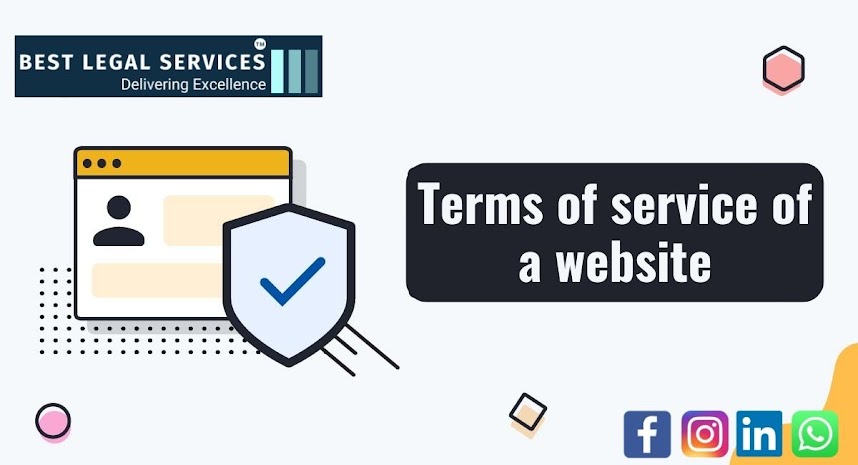Terms of service of a website
Developing a beautiful website is an exciting experience. When thinking about patting yourself on the back just after pouring out all your creativity on a beautiful landing page, halt! Have you thought about a tea table discussion with your boring legal team to frame the website's Terms of service?
Why? No one reads the Terms of service!
We agree that
when you are crazy about driving visitors to the website, how
can you risk losing them with a puzzling pop-up showing an irritating message,
“do you agree?” We are sure you would also dislike receiving legal notices for
compensation claims from visitors to your website. Similarly, won’t you
like to sue the infringers?
Is Terms of service a legal requirement?
Terms of service (TOS),
also called Terms of use or Terms and conditions, are not
mandated by law. According to Section 43(A) of the Information Technology Act
2000 and IT Rules 2011, if a business in India possesses, deals with, or handles any
sensitive personal information, it must disclose its privacy policy. In the
international arena, GDPR in the EU, CCPA in California, and other similar
legislations in various countries make a privacy policy mandatory for using
personal information. As privacy policy is mandatory to protect the user, Terms
of services cover the website owner's interest.
What are the website's Terms of service, then?
It is a binding legal agreement to set a user's obligations and the
service provider's responsibilities. In a nutshell, it is a valid contract by
which the service provider offers services under certain conditions that the
user agrees to meet.
How the website user signs the Terms of
Services?
Websites follow any of the
following methods:
Click-Wrap
e-contract: It is a digital binding contract
where the user is prompted to accept or decline by clicking on the specified
area on the screen. Here, the customer can choose to accept/ agree or reject/
disagree.
Browse-Wrap
e-contract: It has two parts:
1. An
hyperlink part; usually kept at the bottom or any other place on the page, and
by clicking, the legal page is opened,
2. The
legal page contains an agreement stating that those terms and conditions bind the user to use the site.
Advantages of Terms of service
- It helps to limit the legal liability of the website.
- Protects your on-site business by limiting legal liability.
- Limits legal liability on comments, posts, & remarks made by users.
- Useful in setting up the expectations of the website users.
- Protects your website's Intellectual Property Rights (IPR).
- Legally prevents cyber attacks like malware, phishing, SQL injection, Man-in-the-Middle (MitM) attacks, Denial-of-Service (DoS) attacks, etc., by clearly calling out conditions for termination.
- Helps to address the legal issues related to the user's age.
- Specifies Governing Law.
Must have clauses of website Terms of
Service:
It should be easy to read and
with minimum legal jargon but essentially cover the following:
·
A user guideline (rights & obligations)
·
Privacy policy (if applicable)
·
Cookies policy (if applicable)
·
Payment & Refunds
·
Limitations of Liability
·
Intellectual Property Rights
·
Governing Law
·
Termination
·
Indemnity
·
A disclaimer about changes and revisions of the
terms.
Why choose Best Legal Services?
By the numbers, most of my readers are website users, not owners. Then be careful! According to a study, website visitors invest 5.59 seconds in written content. Won’t you explore TOS instead of agreeing with the unknown? It is always recommended to take help from a legal expert to draft a suitable TOS that protects the rights of both users and developers without legal jargon.
The reasons why the best legal services (www.bestlegalservices.in) can help you frame the Terms of Service for your website better than anyone:
- Knowledge of latest legal developments
- Ensures incorporation of suitable clauses and legalities for an agreement.
- Can explain the legal terms better than other professionals.
- Will turn as your first point of reference in any legal crisis relating to website terms and conditions drafted by them.
- Less possibility of leaving any loop-whole in the agreement by them.

.jpg)
Comments
Post a Comment